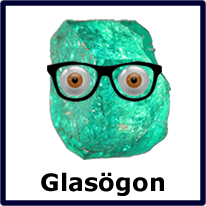
Recently I learnt an interesting word in Swedish – glasögon, which means glasses or spectacles, and literally means “glass eyes”.
Glas means glass, and comes from the Proto-Germanic *glasą (glass), from the Proto-Indo-European *ǵʰel- (to shine, shimmer, glow) [source].
Ögon is the plural of öga (eye), and comes from the Old Swedish ø̄gha (eye), from Old Norse auga (eye), from Proto-Germanic *augô (eye), from Proto-Indo-European *h₃ekʷ- (eye; to see) [source].
The Swedish word glas reminds me of the Russian word for eye, глаз (glaz), which I remember by thinking of a glass eye. Глаз comes from the Old East Slavic глазъ (glazŭ – ball, eye), from the Proto-Slavic *glazъ (ball), from Proto-Indo-European *g(ʰ)el- (round, spherical, stone) [source].
The Russian word for glasses is очки (ochki), which comes from очи (ochi), the plural of око (oko), the old Russian word for eye, which comes from the same Proto-Indo-European root as öga and eye [source].
In Danish and Norwegian, the word for glasses is briller, which means ‘a person wearing glasses’ in Dutch, and to shine or sparkle in French [source]. The German word for glasses is simliar – Brille, and the Dutch is bril [source].
Briller, Brille and bril come from the Middle High German berillus (beryl), from the Latin beryllus (beryl), probably from the Ancient Greek βήρυλλος (bḗrullos – beryl), from Sanskrit वैडूर्य (vaidurya – a cat’s eye gem; a jewel), from Dravidian. Probably named after the city Velur (modern day Belur / ಬೇಲೂರು) in Karnataka in southern India. The first glasses, made in about 1300 in Italy, were made from beryl [source].
Beryl is a mineral which comes from three forms: morganite (orange), aquamarine (blue-green – pictured top right) and heliodor (green-yellow).
The French word for glass, lunettes, means “little moons” [source].
Are there interesting words for glasses, spectacles, specs, or eyes in other languages?
Turkish has “gözlük”; göz=eye + the suffix “-lük” used for containers.
Japanese has “megane” (めがね, 眼鏡). The first kanji 眼=eye and the second one is 鏡=mirror. Actually the reading “me” (め) is the reading of another character for eye, 目. And “kane”, (かね), becoming “gane” (がね) in compounds is probably the reading for 金, the kanji for gold, also used in the meaning of metals in general. Mirrors didn’t use to be made with glass but with metal in the past as we know. The kun reading “kane” is used for money, while the reading for gold and metal is the on reading “kin” (きん)
The old Russian word “очи” for eyes are used in a poetic manner, as seen on the Russian song “Очи чёрные” (ochi chyornye=black eyes)